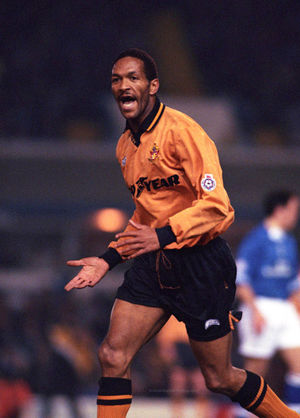After years of struggles through apartheid, South Africa were able to celebrate a triumph which brought the country together. As Paul Berry discovered.
It is 30 years since Mark Williams scored his only goal for Wolves, in a 5-1 away win against Fulham in the League Cup
A nice goal too, exchanging passes with Mark Atkins before turning inside the defender and, with the calm patience of any top goalscorer, finishing confidently past Tony Lange.
A good moment, on a very good night. But let’s be honest. It pales into complete insignificance in the life and times of Mark Williams when you consider what happened just four months later, on February 3rd 1996.
That was the incredible afternoon, in front of a crowd of 80,000 at the FNB Stadium in Johannesburg, that Williams wrote himself into South African folklore.
In the final of the African Cup of Nations, on home soil, with legendary President Nelson Mandela in the crowd, Williams came off the bench to score twice in three minutes to see off Tunisia and send a country into total delirium.
Just four years after being reinstated by FIFA after years of suspension due to the decades of racial segregation of apartheid, ‘Bafana Bafana’ were top of the pile in African football. It was their first ever AFCON, and they haven’t won it again since.
Coming just six months after the Springboks had lifted the Rugby World Cup in the first tournament they were allowed to enter, also on home soil, South Africa felt as though they were on top of the sporting world.
Thanks in no small part to Williams’ heroics.
“We had not long been back in FIFA and I remember Clive Barker the coach telling me I was going to be part of the future of the national team,” he explains.
“I’d only been at Wolves for a few months and they were keen for me to stay with the club rather than go to AFCON, and actually offered me a bonus on top of my salary.
“It was a big decision for me, and it wasn’t easy, but when your country calls, it has to come first.
“And I think it proved to be the right decision!
“When you think about apartheid and what life had been like, we hadn’t been given equal opportunities, and life had been difficult.
“But when opportunity came to me in that tournament, and I had those chances in the final, I just made sure that I grabbed it.
“We followed on from the rugby team, the Rainbow Nation, players of all colours, who when they went on the pitch, were unstoppable.
“And to meet Nelson Mandela, well that was just incredible - what a President, he loved the game so much and knew about every single player.
“The ‘Madiba Magic’ as it was called, the impact of Nelson Mandela…that meant so much to us, and when he spoke it just lifted us and made us want to give everything.
“He used to tell us about how sport could change the lives of each and every person in the country, and that is certainly what happened in 1996.”
For it to be Williams who popped up with the crucial tournament-defining goals on that euphoric February day was particularly poignant.

Mark Williams in action for Wolves. Picture: Dave Bagnall.
When you talk about apartheid, discrimination, poverty, and the troubles endured by so many young South Africans of that era, he was very much a part of that troublesome situation.
Growing up with his mother and five siblings in a one-room house in Rondevlei in the Western Cape, time was spent with friends, often at a local scrapyard, until at the age of nine, social services decreed that Williams and his older brother needed to move, to live with their father and grandfather in the suburb of Claremont.